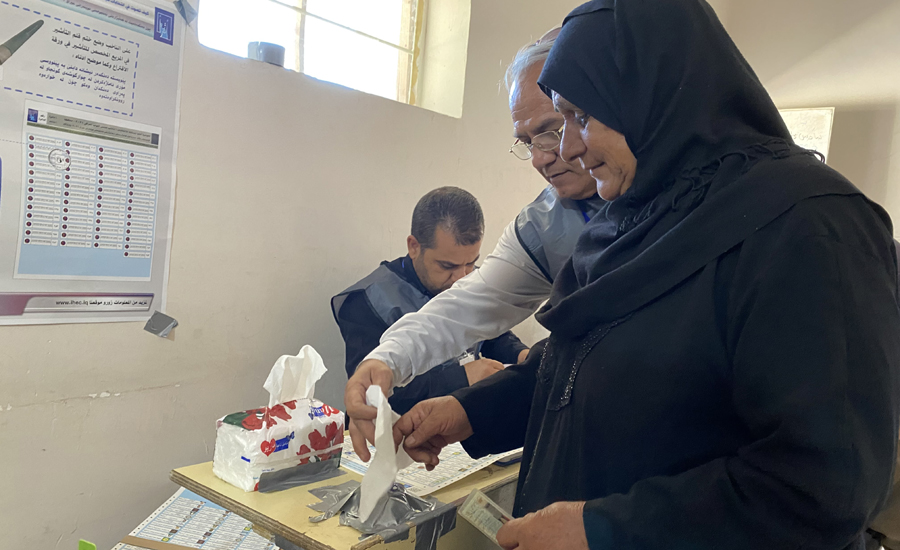Organizations and unions advocating for rights of journalists have recorded few instances of assaults against journalists in the general elections of October 10th and some have recorded no case, a positive indicator that violence against journalists amid elections has sharply dropped.
Organizations monitoring freedom of press in Iraq including Kurdistan region have noticed a shrap decline in number of instances of assaults toward media in the latest elections compared to previous once. However, KirkukNow have noticed some cases via its network of reporters.
Nabaz Rashad, reporter for Sulaymaniya-based Westga news website, said he was assaulted on elections day.
"In private voting day, there was a big stampede in Yazdanhot center in Ainkawa district of Erbil. One of the security forces fell to the ground and this was broadcasted," Rahsad recalls.
The supervisor of the polling center asked to meet Rashad and ordered him to delete the video and he rejected. "He insulted me and my media outlet."
In another incident, Rashad covered another polling station and took a photo of a fingerprint machine used by the Independent High Electoral Commission IHEC to recognize ID of voters.
"The manager of the station threatened he will beat me though I showed him my badge."
Metro Center for journalists rights and advocacy says only six cases of assaults against journalists took place in Iraqi Kurdistan Region IKR and other cases were not related to elections.
"This time the elections were different and I believe the system IHEC practiced, its instructions for the candidates and journalists, and how to lead media campaigns have reduced cases of violence," said Rahman Gharib, coordinator of Metro.
The system IHEC practiced has reduced cases of violence
The IHEC have provided press IDs for the media outlets to cover the polling stations it has specified for media coverage.
According to the new electoral system, Iraq was divided into 83 constituencies which limited the area of media campaigns for the candidates and their blocs and resulted in relatively mild campaigns and easier coverage by the media.
In the past, each province was one electoral district which led to intensive media campaigns and rivalry among the competitors.
"The media played a big role in this atmosphere as the mood was soft. We hope the electoral commission in IKR takes this method into consideration for upcoming elections yet to allocate more stations for media coverage," Gharib added.
Non-governmental organizations NGOs and centers monitoring the elections noticed the absence of violence against journalists except few cases.
Tammuz Organization, which had 1,310 monitors all over Iraq "had no report about violence against journalists because there were no cases in the areas we had observers," said Vian Sheikh Ali, supervisor of monitoring team of Tammuz.
Network Alliance, made up of four networks and NGOs, said in their final report published by Shamis (The Sun) network that no case of assault against any journalist has been recorded.
Hogir Chato, head of Shamis network, said "in terms of security, it was far better compared to previous ones which resulted in less violence against journalists."
It was far better compared to previous ones which resulted in less violence against journalists
On October 8th, 2 days ahead of elections day, Metor said in a report that 41 cases of violence were reported against 36 reporters within three months ahead of elections yet Gharib said only six instances were linked to the elections.
Metro said 9 cases were reported in private ballot day: 2 journalists were beaten and in the other seven cases, journalists faced obstacles in media coverage.
"Less cases of violation against journalists is a positive indicator in favor of the IHEC and Kadhimi's cabinet… It was IHEC's clear guidelines that mae media's mission easier."
Isra Tariq, mission of the society to defend freedom of press, said they have not registered any case in private and public voting while last year they have documented 268 cases, 77 of it in Baghdad.
For the media outlets, it was one of the rare events that have passed peacefully.
Mountazir Nasir, editor-in-chief of al-Alam al-Jadid media establishment, said in 2018 elections more cases of violations were seen. "In Baghdad, there were only three cases.
"It was the first mission of the new board of IHEC. Secondly, there was a big nymber of foreign media outlets and observers. All these positively reflected."
Omar al-Hassani, a Mosul-based freelancer, said he faced no difficulty in covering private and public ballot. "There was a very good cooperation among the media and IHEC."
"It was a friendly mood and I have heard no complain by Mosul reporters. The security forces were also helpful."
This was not the full picture of the elections as it was not 100% violence free.
Sabah Sofi, correspondent of Sulaymaniyah-based Nalia Radio and Television NRT in Duhok, said he was insulted by four people in ordinary dress whilce veering special voting in Qasork preparatory school.
"One of them was a staffer of IHEC. They insulted me and one of them attacked me trying to take the camera and the stand," Sofi recalled.
Sofi said the police and the security forces guarding the polling center were





